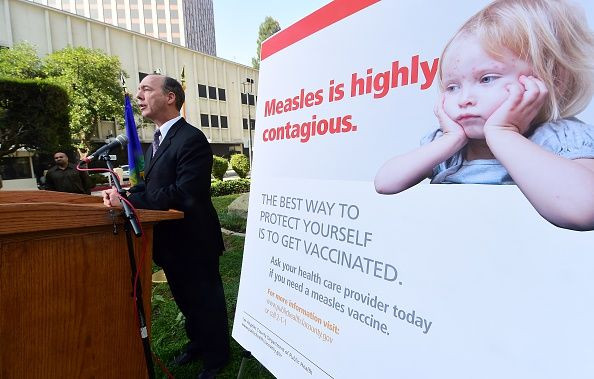Measles Outbreak: Symptoms, Treatment And Facts You Should Know

Health officials in Clark County, Washington have declared a public health emergency in response to the measles outbreak in the nearby Portland area. State figures reveal that 7.9 percent had been exempted from the mandate that children entering kindergarten should have been vaccinated for the disease before being accepted. Of this number, only 1.2 percent were medically excused, while the rest cited non-medical reasons and even parents’ refusal to do so.
With measles apparently making a comeback in the U.S., Seattle Children’s Hospital pediatrician Douglas J. Opel said that preventive steps need to be made urgently. Measles is a highly contagious disease that can be instantly deadly if unaddressed — and it is the young children that suffer the most because they are unprotected. Here are facts every family should know about measles symptoms and treatment.
1. Typical symptoms
According to the Centers for Disease Control and Prevention (CDC), measles usually starts with coughing, runny nose, red and watery eyes and high fever. When one gets infected, the symptoms take about seven to 14 days before they emerge. When it starts, watch out for the appearance of Koplik spots (tiny white spots) on the side of the mouth after two to three days. Then the flat red rashes emerge, usually on the hairline and the face, and then to the neck, abdomen and extremities. When the rashes appear, fever could go beyond 104 degrees Fahrenheit.
2. Measles is highly contagious
Measles is airborne, which means it spreads when an infected person sneezes or coughs. It is so contagious that nine out of 10 people who are exposed to it and are not protected will definitely get it. Note that the virus remains in a room as long as two hours after an infected person has left and because the symptoms do not manifest until after a week or two, most people can’t tell that they already have it.
3. Measles is not totally eliminated in the U.S.
In 2000, the U.S. healthcare department announced that measles has been eliminated because of a well-distributed vaccination program. Today, however, as many possibly unvaccinated travelers enter the country and the number of households that are against any form of vaccination increases, the risk once again is high.
4. Shielding your family against measles
The CDC said that thr best protection against this potentially deadly disease is still the MMR vaccine, which is given in two doses to children at 12 to 15 months old and then at 4 to 6 years old.
© Copyright IBTimes 2024. All rights reserved.




















